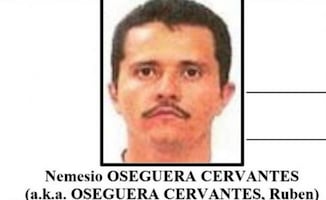Más Información

"El Mencho", una década bajo acecho en México; el líder del CJNG fue localizado en cinco ocasiones y logró huir

Sheinbaum llama a la calma tras bloqueos por muerte de "El Mencho"; destaca coordinación con los estados

Estos son todos los eventos deportivos cancelados o reprogramados por la violencia en Jalisco; minuto a minuto
Once, there was a man who was considered the “most dangerous man in the world” but now, he is nothing more than a lonely old man who complains constantly about headaches and sore throats.
After two years of being captured for the third time, Joaquín Guzmán Loera , better known as “ El Chapo ”, went from being the boss of the most powerful drug cartel in the world to a depressed man who has trouble remembering, according to his lawyer, Eduardo Balarezo.
It's been a year since his extradition to the United States and "El Chapo" has spent each and every day of that year locked up in a 21x21-meter cell – he is only allowed an hour a day inside a workout room which only has a bicycle and a TV screen.
Such is life in solitary confinement at the Metropolitan Correctional Center in New York , a place considered worst than the Guantánamo Bay prison. “If you wanted to intentionally design a place to drive people mad, you'd be hard-pressed to do better,” wrote David E. Patton, the executive director of Federal Defenders of New York.
In 2011, the head of the U.S. Drug Enforcement Administration (DEA), Jack Riley, claimed that if the Italian organized crime groups were pitted against “El Chapo” and the Sinaloa Cartel “it wouldn't be fight,” declaring Guzmán Loera was beyond the infamous crime bosses such as Al Capone .
According to an article in The Rolling Stone magazine, “EL Chapo” was born in a poor family of farmers. He sold oranges at the age of 6 and helped his parents with their corn crops.
He didn't have a chance to “make an honest living” since at 15, by his own words, his only shot at surviving became drug trafficking.
“I was raised in a ranch named La Tuna. In that area, and up until today, there are no job opportunities. The only way to have money to buy food, to survive, is to grow poppy, marijuana, and at that age, I began to grow it, to cultivate it and to sell it," he told The Rolling Stone .
He was soon the protegé of infamous drug lords of the 80's Miguel Ángel Félix Gallardo and Rafael Caro Quintero, and went on to become the most wanted man in Mexico and the United States.
According to Forbes magazine , Joaquín Guzmán Loera was one of the wealthiest men in the world in 2009.
Now, at 60, he is only allowed to receive the visit of his 6-year-old twins and his lawyer.
am
Noticias según tus intereses
[Publicidad]
[Publicidad]











